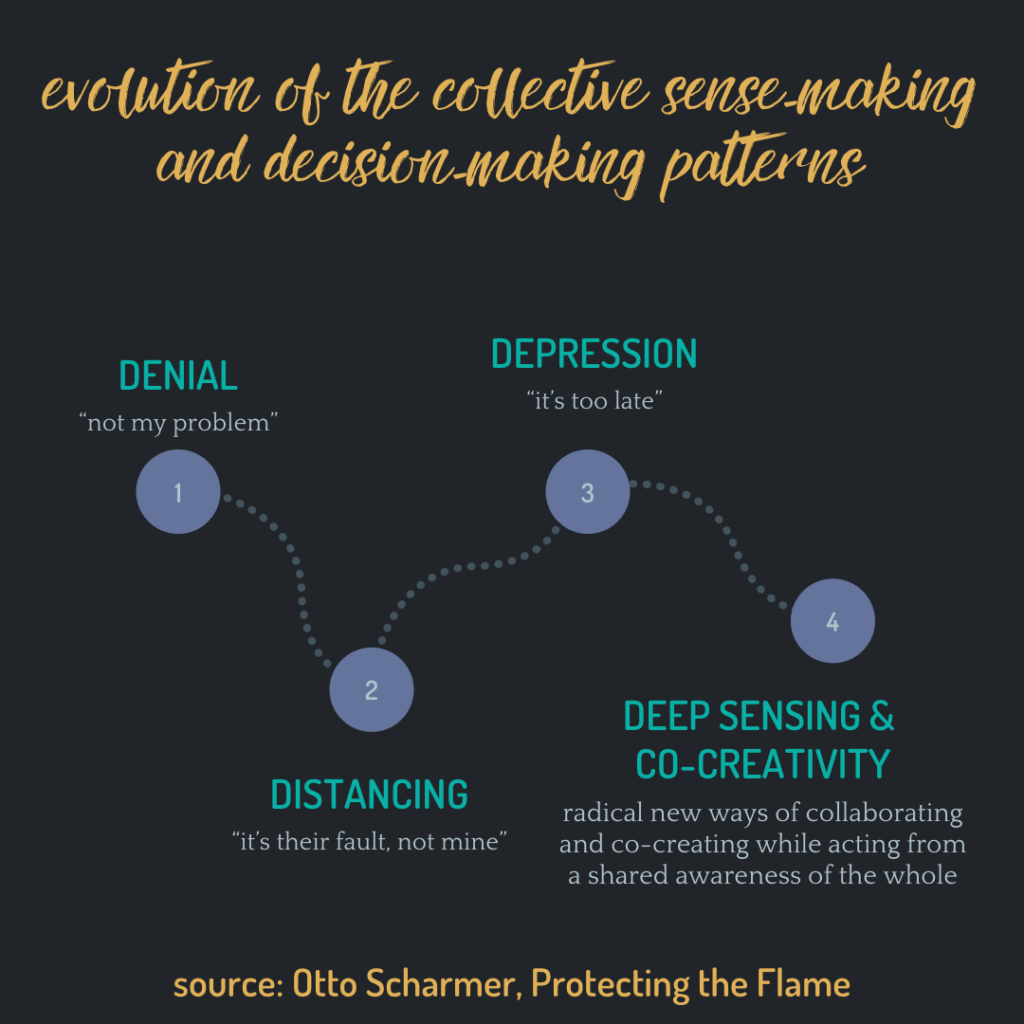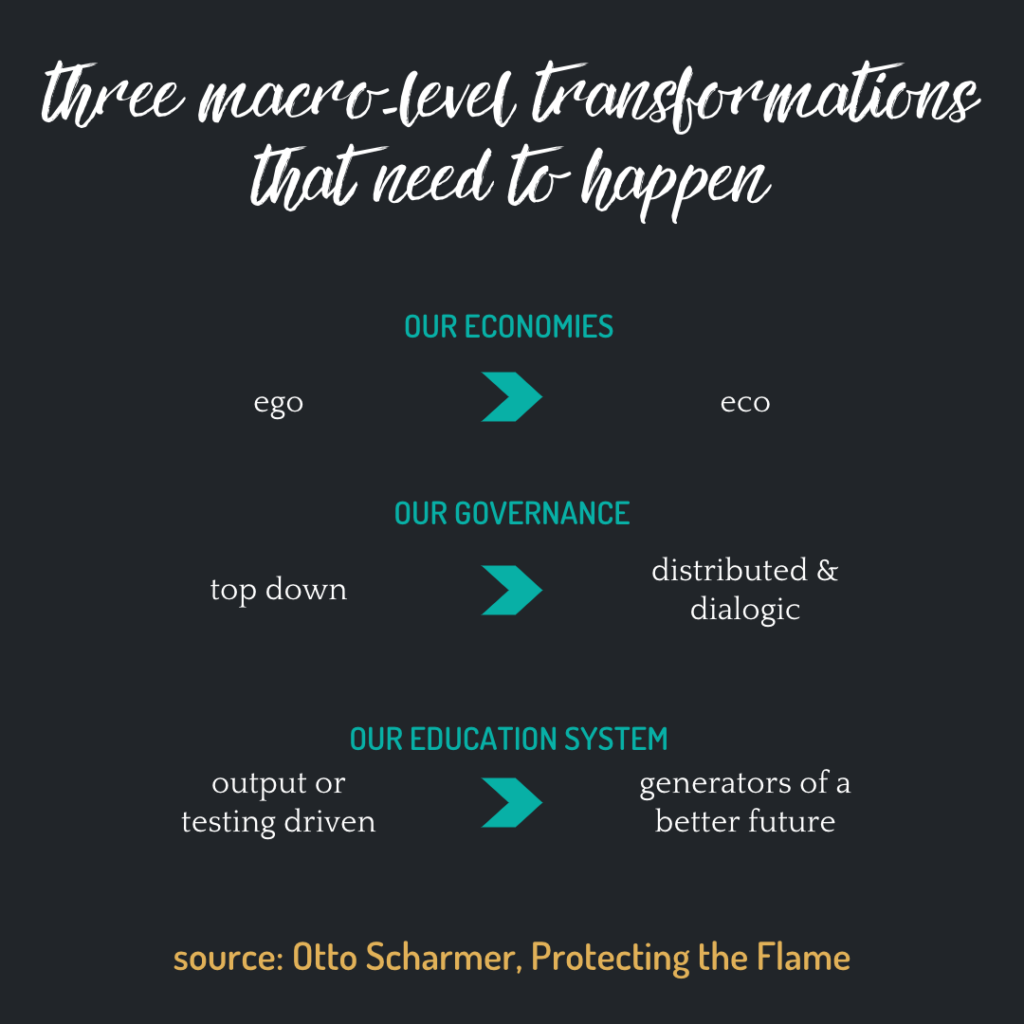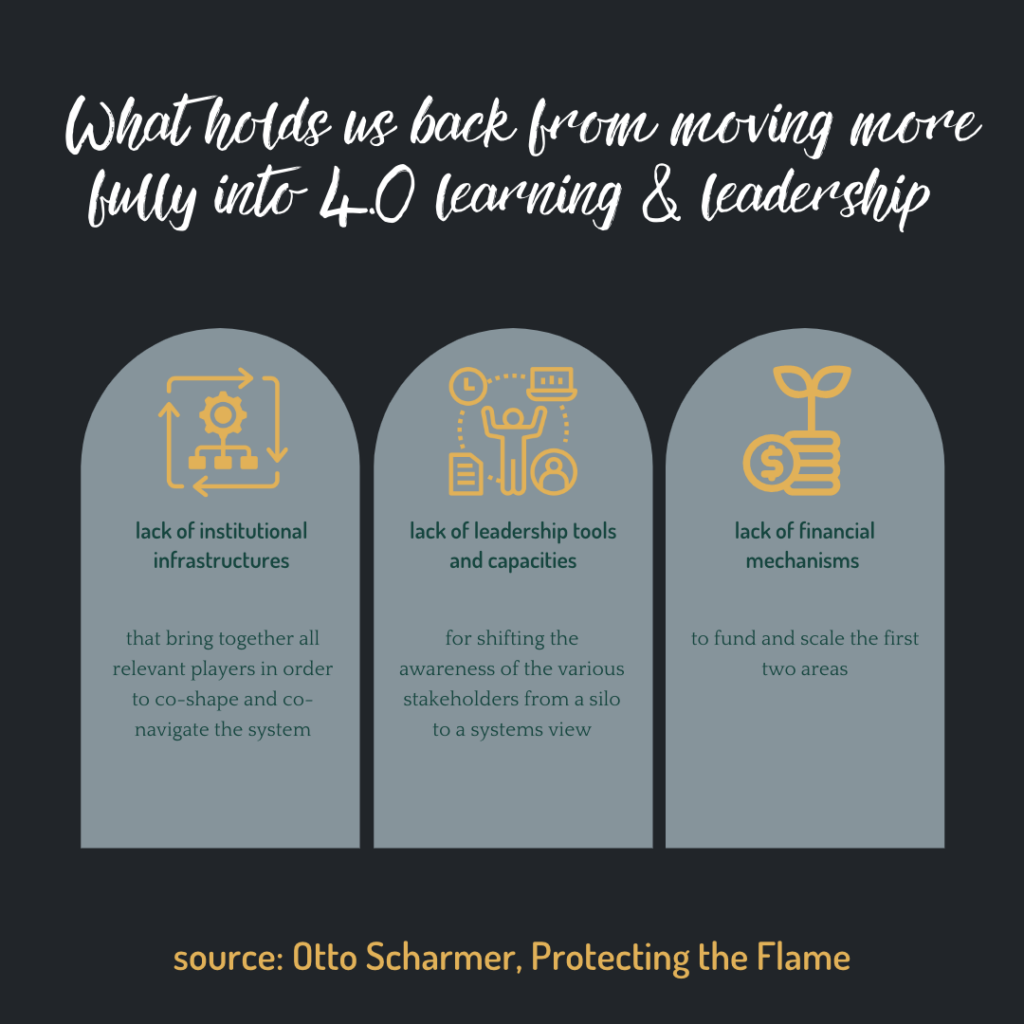Circles of Radical Presence in Times of Collapse
Otto Scharmer Sep 6
Reflections by Scharmer on gatherings he had been to recently and the themes he was noticing.
Both gatherings were convened with the intention to reimagine our path to a future that is regenerative, peaceful, and just.
Otto Scharmer
Theme 1: accelerated breakdown and collapse.
- degradation of our ecosystem
- climate destabilization
- falling water tables
- loss of topsoil,
- loss of biodiversity
- social system breakdow
- heightened levels of polarization
- inequality
- racism
- violence
- war
- beginnings of climate-related mass migration
Theme 2: sinking feeling
- Feeling that it’s too late
- Collective depression, especially in youth who face the crisis into the future
Theme 3: the knowing-doing gap
The paradox that we know almost everything that is necessary to prevent civilizational collapse — we have most of the knowledge, most of the technologies, and all the financial means necessary to turn things around — and yet we are not doing it.
Otto Scharmer
What do these themes tell us?
They tell us that we live in a moment of transition where one civilization is ending and dying and another one is being born. And as custodians of planet earth and all its species, we are called to protect the flame of our highest future possibilities.
Otto Scharmer
Civilizational collapse embodies 3 features
1. Hard facts
- we have evidence of degradation, disintegration, breakdown and collapse
2. Collective fields of conversation
- losing capacity to converse about what’s happening made worse by dirty money, and tech that support misinformation & negativity
3. Human spirit
- mental health struggles and helplessness to respond
What I would like to offer here is a different interpretation of the collective condition of depression that weighs so heavily on our current moment. I see our collective condition as a sign of hope (because it signifies a departure from denial).
Otto Scharmer
Evolution of the collective sense-making and decision-making patterns roughly follows these four stages:
Denial > Distancing > Depression > Deep Sensing & Co-creativity

Denial
- discounting the real future impact of our decisions (“not my problem”)
Distancing
- acknowledging the problem, but allocating the blame to someone else (“it’s their fault, not mine”)
Depression
- after realizing that denial and distancing won’t solve anything, the sinking feeling that “it’s too late”
Deep Sensing & Co-creativity
- managing to stay in the moment, holding your gaze steady, and then letting go (of the old) to allow new possibilities to emerge. In the simulation, this stage often leads the participants to radical new ways of collaborating and co-creating while acting from a shared awareness of the whole.
How do we get from stage 3 to 4?
What bridges the gap from depression to deep sensing and co-creativity?
Our coordination mechanisms need to evolve. Instead of only relying on external mechanisms, we need to interiorize the collective impact, we need to coordinate and act from a shared awareness of the whole. This can only happen if we deepen our interiority or, in other words, interiorize externalities (i.e., our blind spots) so we can more appropriately respond to the challenges of our time.
Otto Scharmer
What does it mean to protect the flame?
Protect the flame is quite different from, say, carrying or waving a torch. What I saw with my inner eye looked more like a candle: you hold the candle in one hand, and you protect the flame with the other — by holding it very close to your heart.
Otto Scharmer
We need to transform:
Our economies from ego to eco
Our governance from top-down to distributed & dialogic
Our educational systems from output or testing driven to generators of a better future

Transforming economies from ego to eco
- Eliminate poverty
- Invest in creation of regenerative economies
- IP rights waivers
- Reduce inequality
- Progressive taxation and closing loopholes
- Citizen fund for shared wealth distribution
- Empower women
- Increase education for women
- Achieve gender equality in leadership
- Transform food systems
- Eliminate harmful subsidies to industrial agriculture
- Reduce food waste
- Promote plant-rich diets
- Transform energy systems
- Phase-out fossil-based energy systems
- Increase energy efficiency, reduce consumption
- Electrify, powered by renewable resources
Transform Governance from Top-down to Co-creative & Dialogic
Current decision-making structures often operate under the lopsided influence of organized interest groups which favors small groups that can organize easily (such as a monopoly industries) over big ones that cannot (those that work for the interests of all citizens), and that favor citizens with a voice (current generations) over those with no voice (future generations and the planet itself)
Otto Scharmer
All governance is about geometries of power. The question is to redesign and evolve our democracy and governance systems in ways that make the widely shared aspiration for transformative change — which we witness today in most countries — relevant for collective decision making.
Otto Scharmer
- Eg: Chile
- New constitution voted yet now difficulty agreeing on proposal.
- Need more conversation and a better supporting infrastructure
- True dialogue to traverse different viewpoints and ideologies
- Harbinger of what is to come for other countries
- First breakdown of social order followed by renegotattaon and reimagination of a new social contract
Transform Learning & Leadership to Create the Future
- we need to transform our education and lifelong learning systems.
- Evolve from rote learning and focus on individual learning and capacity building towards learner-centric modalities that build the capacity for co-sensing and co-shaping the future.
The most important systems challenge today is trying to solve 4.0-type problems with response mechanisms that are still bounded by 2.0 and 3.0 ways of operating.
Otto Scharmer
What holds us back from moving more fully into 4.0 ways of operating are three main barriers:
A lack of institutional infrastructures that bring together all relevant players in order to co-shape and co-navigate the system.
A lack of leadership tools and capacities for shifting the awareness of the various stakeholders from a silo to a systems view — i.e., from ego to eco.
And a lack of financial mechanisms to fund and scale the above.

- Transformations will not happen by themselves
- Only happen if supported by new societal learning infrastructures that are scalable, place- and region based
- Key that they use personal transformation as a gateway for systems transformation
When systems collapse, what are we left with? We are left with each other. We are left with our relationships. With how we relate to Mother Nature, how we relate to each other, and how we relate to our emerging Selves. These are our three sources of protecting, tending, and cultivating the flame.
Otto Scharmer